Uganda’s housing market gradually improving
This is a housing market which seems poised for growth. Robust economic growth, declining inflation, a large rental market and good yields. What more could you wish for?
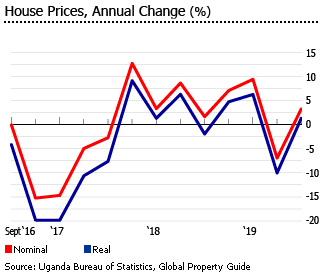
During the year to Q3 2019, the nationwide residential property price index rose by a modest 3.25% (1.3% inflation-adjusted), following a y-o-y decline of 6.9% in Q2 2019 and annual rises of 9.4% in Q1 2019, 7.1% in Q4 2018 and 1.7% in Q3 2018, according to the Uganda Bureau of Statistics (UBOS).
The latest quarter was unusually strong. Nationwide house prices rose strongly by 6.2% during the latest quarter, Q3 2019 (5.5% inflation-adjusted).
In Kampala, Central and Makindye, residential property prices surged 18.5% during the year to Q3 2019 (16.3% inflation-adjusted).
In Nakawa, house prices rose by a minuscule 0.6%, but actually fell 1.3% when adjusted for inflation. In contrast, modest house price falls were registered in Wakiso (-3%) and in Kawempe and Rubaga (-2.5%) during the year to Q3 2019.
Demand is rising, amidst improving investor confidence. The total amount of mortgages outstanding rose by 11% y-o-y to UGX1.34 trillion (US$362.33 million) in September 2019, according to the Bank of Uganda. Likewise, credit advanced to the real estate sector as a whole, comprising of building, mortgage and construction, increased 12.8% y-o-y to UGX 3.19 trillion (US$860.9 million) over the same period.
“Business and consumer confidence considerably improved, in line with improved performance of the economy,” said Arthur Mukembo of Re/Max Uganda.
“The increase in enquires for modern standalone houses registered in H1 2019 is expected to push up demand for the limited stock of existing modern standalone houses,” said Knight Frank in its Kampala Market Update H1 2019. “This, in turn, is expected to positively impact house prices in the range of 5%-10%.”
Yet residential construction remains weak. The construction sector price index for residential buildings fell by 0.2% in August 2019 from a year earlier, according to UBOS.
Uganda’s economy grew by a robust 6.1% in 2018, up from the prior year’s 5% growth and the highest expansion since 2011, according to the International Monetary Fund (IMF). The economy is projected to grow by 6.2% this year.
The 1995 Constitution grants land ownership rights solely to citizens of Uganda. Foreigners cannot own land freehold. They may, however, obtain leases for 49 or 99 years. Foreigners can either rent/lease from citizens or from the Government.
Local house price variations
Kampala, the capital and the largest city in Uganda, has the country´s most expensive housing. The average price of two- and three-bedroom apartments in prime residential areas of Kampala stood at US$280,000 and US$325,000, respectively, in the first half of 2019, according to Knight Frank. The average price for four- to five-bedroom bungalows was US$ 1 million.
Apartments in high-end areas such as Kololo, Nakasero, and Bugolobi, can go as high as US$2,000 per square metre (sq. m.), according to Cytonn Report. In Kampala’s upper middle-income areas of Naguru, Mbuya, Luzira, Muyenga, Lubowa and Ntinda, the average price of apartments was US$1,160 per sq. m.
In Kampala’s middle-income suburbs of Bukoto, Kiwatule, Kira, Naalya, Namugongo, Buziga, and Bunga, apartments sell for an average price of US$900 per sq. m.
Outside the city centre, apartments sell for an average price of just US$500 per sq. m.
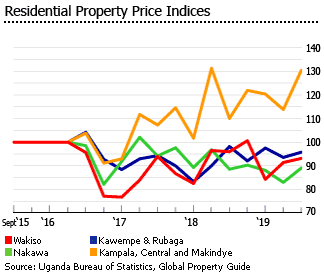
Because of the relatively low prices of land and properties in neighbouring areas of Kampala, such as in Mpigi, Mukono and Wakiso, as well as the improved road networks to these towns, big property developers are now eager to build new housing projects in these areas.
“As the suburbs closer to the CBD become densely commercialized, we expect residential developments to increase in peripheral locations to the CBD where rents are catching up with that of core locations,” said Knight Frank in its H1 2019 market report.
Shortage of low-cost housing
Demand for low-cost housing continues to grow in Uganda, amidst rapid population growth and urbanization. There is a housing shortage of 2.1 million units, growing by 200,000 annually, according to UBOS. Kampala alone has a housing deficit of about 600,000 units.
“The challenge of population growth is real – the current growth rate of 3.2% per annum, roughly means that after every 20 years, our population doubles,” said Housing state minister, Dr. Chris Baryomunsi.
Aside from the National Housing and Construction Company (NHCC), private developers provide most of the affordable housing supply, including Jomayi Property Consultants, Canaan Sites, Hossana, Heritage Sites, Sema Properties, and Zion Construction, according to the Centre for Affordable Housing Finance in Africa (CAHF).
A one-bedroom affordable housing unit is typically offered for UGX 47 million (US$ 12,700) to UGX 85 million (US$ 23,000). Two- and three-bedroom units are priced at UGX 150 million (US$ 40,500) and UGX 200 million (US$ 54,000), respectively.
“The increasing access to finance, coupled with significant housing demand, should present ample opportunity for housing delivery in the affordable segment of the market,” said CAHF in its 2019 Yearbook.
Uganda’s current housing stock is estimated at about 8 million units.
Mortgage rates still very high
Mortgage rates remain very high:
- The weighted average lending rate for local currency mortgage loans was 22.6% in 2018, up from 20% a year earlier, according to the Bank of Uganda.
- The average lending rate for foreign currency-denominated residential mortgage loans was 11.3% in 2018, up from just 7.2% a year ago.
- The average lending rate for foreign-currency denominated loans for land purchases was 9.3% in 2018, up from 9% a year earlier.
Because of these very high interest rates, it is not surprising that Uganda´s mortgage market remains very small. Properties are usually sold in cash. The mortgage market is tiny - only 1.2% of the country´s GDP, unchanged in the past three years, but up from 0.3% of GDP in 2002.
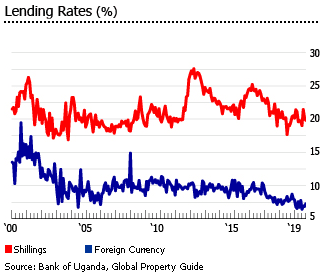
Housing Finance Bank dominates Uganda´s mortgage market, with 55% of the total mortgage portfolio, followed by Stanbic Bank, Standard Chartered Bank, DFCU Bank, KCB Bank and Centenary Bank.
The biggest challenge for local housing finance lenders lies in their inability to raise long-term funds, due to the nature of the deposit base.
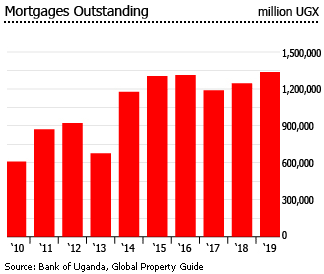
“Most banks still rely on retail and wholesale deposits to support up to 80.4% of bank lending. Such deposits support very short-term operations, with less than 15% available to issue credit,” said CAHF. Also “Banks continue to rely heavily on pension funds available on a one-year recurrent basis. Existing pension sector regulations still restrict the use of pension assets for long-term credit by banks.”
Huge rental market, yields can be excellent
Uganda’s rental market is huge, as people prefer to rent than to buy property. In Kampala, over 71% of households rent their dwellings, according to CAHF. Nationwide, over one-fifth of all households rent.
Occupancy rates in prime residential suburbs in Kampala, including Nakasero, Kololo, Naguru, Mbuya and Bugolobi, increased to 78% in H1 2019 from 69% in the same period last year, according to Knight Frank’s Kampala Market Update H1 2019.
In the first half of 2019:
- The average rent for two-bedroom apartments in prime residential areas in Kampala was US$2,250, up 7% from a year earlier, according to Knight Frank.
- The average rent for three-bedroom apartments was U$2,750, down 5% from a year ago.
- The average rent for four- to five-bedroom bungalow houses stood at US$4,000, up 14% from a year ago.
Rental yields vary considerably, depending on locations and property type. In the city centre, gross rental yields average only 1.3%. On the other hand, gross rental yields outside the city centre can go as high as 10.3%.
In the high-end residential market, two- and three-bedroom apartments offer rental yields of 10% and 8.9%, respectively, according to Cytonn Report. On the other hand, rental yields for three-bedroom villas and stand-alone bungalows range from just 2.8% to 2.9%.
RENTAL YIELDS IN KAMPALA |
|||
| Region | Suburbs | Rental Yields | Occupancy Rate |
| High-end areas | Kololo, Nakasero, Bugolobi | 6.1% | 83.9% |
| Upper middle income areas | Naguru, Mbuya, Luzira, Muyenga, Lubowa, and Natinda | 7.4% | 84.9% |
| Middle-income areas | Bukoto, Kiwatule, Kira, Naalya, Namugongo, Buziga, and Bunga | 5.9% | 88.8% |
| Average | 6.8% | 87.5% | |
| Source: Cytonn Report | |||
New landlord-tenant law underway
In June 2019, Parliament passed the Landlord and Tenant Bill of 2018, with the purpose of regulating the relationship between landlords and tenants. Among the key provisions of the bill, which now awaits presidential assent, include:
- the legal requirement for landlords and tenants to execute a contract for all rent transactions over UGX 500,000 (US$135) with clear terms and conditions;
- it is now illegal for landlords to evict tenants without securing a court order to do so; and,
- all rents shall be settled and recorded in shillings, contrary to the initial proposal that parties can agree to transact in any other currency.
Despite its merits, critics argue that some provisions of the legislation are unreasonable and unfairly target landlords, which could discourage investors into the market.
Robust economic growth, low inflation
Uganda’s economy grew by a robust 6.1% in 2018, up from the prior year’s 5% growth and the highest expansion since 2011, according to the International Monetary Fund (IMF). The economy expanded by an average of 7.8% from 2001 to 2011 and 4.1% from 2012 to 2017.
The economy is projected to grow by 6.2% this year.
In October 2019, core inflation was 2.6%, considerably lower than the 3.5% seen the previous year. Inflation averaged 4.9% in 2013-17 and 9.8% in 2005-12.
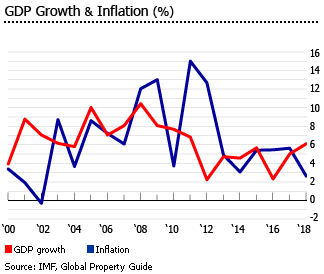
The Ugandan shillings (UGX) appreciated by 2.2% against the US dollar over the past year, to reach a monthly average exchange rate of USD1= UGX3,696.2 in October 2019. The shillings lost almost 33% of its value against the US dollar from 2013 to 2018.
Museveni’s three-decade rule
Uganda is a democracy with considerable issues over freedom of expression and the abuse of human rights. This is ironic, because after President Yoweri Museveni came to power in a rebellion in 1986 he was widely seen as the best of a new wave of democratic leaders, after the horrendous regimes of former presidents Idi Amin (1971-1979) and Milton Obote (1980-1985).
Museveni stabilized the country, introduced democracy, liberalized the press, and responded effectively to the HIV/AIDS crisis, and cooperated with IMF stabilization programs despite an early Marxist background.
However things have deteriorated in recent years. In 2005 Museveni had the constitution changed to allow him to run for an unlimited number of terms. In February 2016, Museveni was elected for his fifth term in office. Then in December 2017, a law was enacted to remove the presidential age limit caps, clearing the way for Museveni to run for another term.
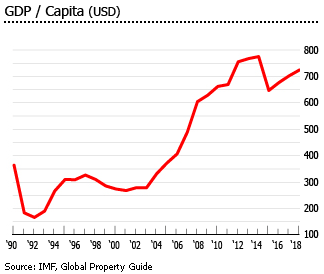
Despite three decades of uninterrupted economic growth, Uganda remains one of the poorest countries in the world, with GDP per capita of only US$724 in 2018. Corruption remains prevalent.
Museveni has also repeatedly involved the Ugandan armed forces in external conflicts. Restrictions on press freedom have greatly increased, and the introduction of the death penalty for homosexuality caused international concern. Internally he is suspected of planning to hand over power to his son when he retires. Despite these concerns, no one suggests that the abuses have reached the extreme levels of the previous Amin and Obote regimes.
Uganda is expatriate-friendly
Uganda is perhaps Africa’s friendliest country, and the warmth and hospitality of the locals often amazes visitors. Kampala’s expatriate areas remain uncrowded, peaceful and pleasant despite the rapid expansion of the city.
The three decades of unbroken growth has led to an increase in the number of expatriates. The development of new residential areas within the outskirts of Kampala has increased the housing supply. The luxury housing sales market is dominated by investor-landlords intending to let to foreigners. The expatriate market can be broadly divided into two, according to Knight Frank, the old areas and the new.
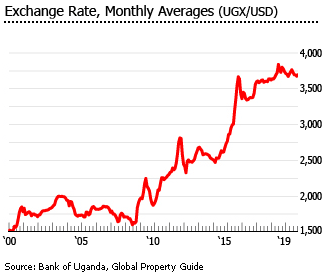
The old areas have been established expatriate housing areas for almost two decades. These areas are within the city centre. They are generally more expensive. The new areas are on the outskirts of the city. They usually have better views, and are less expensive.
Sources:
- Residential Property Price Index (RPPI) First Quarter 2019/20 Press Release (Uganda Bureau of Statistics): https://www.ubos.org/wp-content/uploads/publications/10_2019RESIDENTIAL_PROPERTY_PRICE_INDEX_-_Press_Release.pdf
- Kampala Real Estate Investment Opportunity (Cytonn Report): https://cytonnreport.com/topicals/kampala-real-estate-investment-opportunity
- Housing shortage a concern to government – Baryomunsi (The Observer): https://observer.ug/businessnews/57437-housing-shortage-a-concern-to-government-baryomunsi
- Uganda Country Profile (Housing Finance Information Network): http://hofinet.org/countries/description.aspx?regionID=8&id=171
- What lies ahead for the real estate sector (Daily Monitor): https://www.monitor.co.ug/Magazines/HomesandProperty/What-lies-ahead-for-the-real-estate-sector/689858-4926376-v2auk6z/index.html
- World Economic Outlook Database, October 2019 (International Monetary Fund): https://www.imf.org/external/pubs/ft/weo/2019/02/weodata/index.aspx
- BoU Reduces Central Bank Rate to 9 Percent in October 2019 (Bank of Uganda): https://www.bou.or.ug/bou/bouwebsite/RelatedPages/Publications/article-v2/BoU-Reduces-Central-Bank-Rate-to-9-Percent-in-October-2019/
- Financial Stability Report June 2019 Issue No. 11 (Bank of Uganda): https://www.bou.or.ug/bou/bouwebsite/bouwebsitecontent/FinancialStability/financial_stability/Rpts/All/Financial-Stability-Report-June-2019-final-2.pdf
- Housing Finance in Uganda (Centre for Affordable Housing Finance in Africa): http://housingfinanceafrica.org/countries/uganda/
- Uganda (Centre for Affordable Housing Finance in Africa): http://housingfinanceafrica.org/countries/uganda/#
- Uganda´s total transaction costs are moderate (Global Property Guide): https://www.globalpropertyguide.com/Africa/Uganda/Buying-Guide
- Uganda country profile (BBC News): https://www.bbc.com/news/world-africa-14107906
- Construction Sector Indices (Uganda Bureau of Statistics): https://www.ubos.org/wp-content/uploads/publications/09_2019CSI_PRESS_RELEASES_JULY_AND_AUGUST_2019.pdf
- Parliament passes landlord-tenant bill (The Independent): https://www.independent.co.ug/parliament-passes-landlord-tenant-bill/